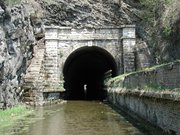Paw Paw Tunnel
|
|
The Paw Paw Tunnel is a 3,118 ft. (950.37 m.) long canal tunnel on the Chesapeake and Ohio Canal, which runs along the Maryland side of the Potomac River. Though surpassed by many tunnels today, it remains one of the world's longest canal tunnels and was one of the greatest engineering feats of its day.
The tunnel lies along the notorious bends of the Potomac River that confounded George Washington's plans to move trade and settlement west along the river. After meeting inventor James Rumsey in Bath the previous year, Washington hired him in 1785 to design locks along the river for the newly launched Potomack Navigation Company. They made several trips together along the route of the Potomac but Rumsey lasted only a year in the job. The Potomack Navigation Company ultimately failed and its assets were eventually turned over to the Chesapeake and Ohio Canal Company.
In 1836, Lee Montgomery, an engineer on the Chesapeake and Ohio Canal Project, estimated that construction of a 3,118-foot tunnel through the Paw Paw Ridge of the Allegheny Mountains would shorten the waterway by six miles. Montgomery also said it would take only two years to build. He was wrong. Armed only with dynamite, shovels, and picks, workers chiseled through the mountain at a painfully slow pace — only 12 feet per week. Historical records of the ordeal are filled with stories of frequent cave-ins, bouts of unpaid wages, cholera, violence, and even murder.
Finally, on October 10, 1850, 14 years after he began, Montgomery broke through the other side of the mountain at the price of his own bankruptcy. Countless tons of coal, farm products, and manufactured goods were carried back and forth by mules and canal boats through the tunnel until 1924, when railways and highways became a more efficient mode of transportation.
The nearby town of Paw Paw and the tunnel take their common name from the fruit tree that grows prolifically along nearby ridges.

